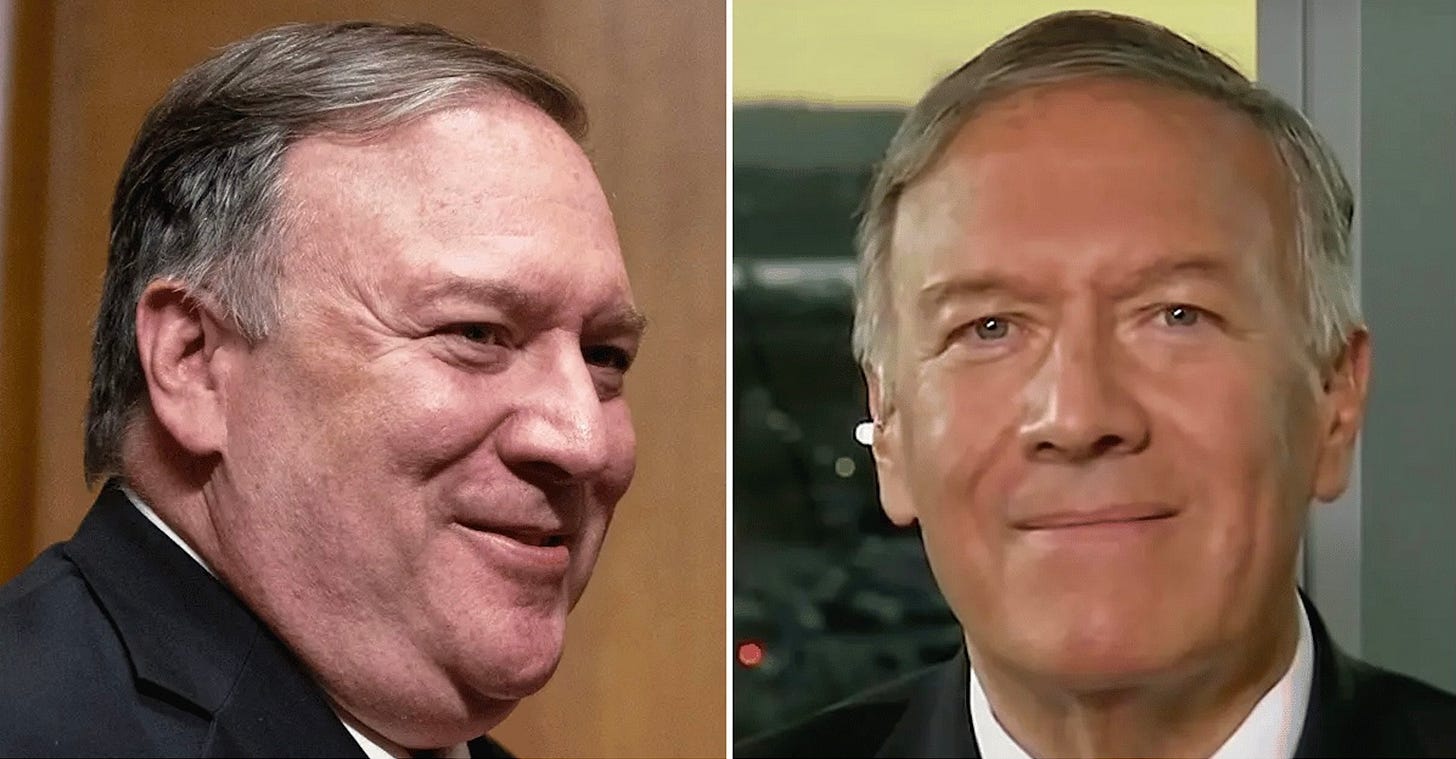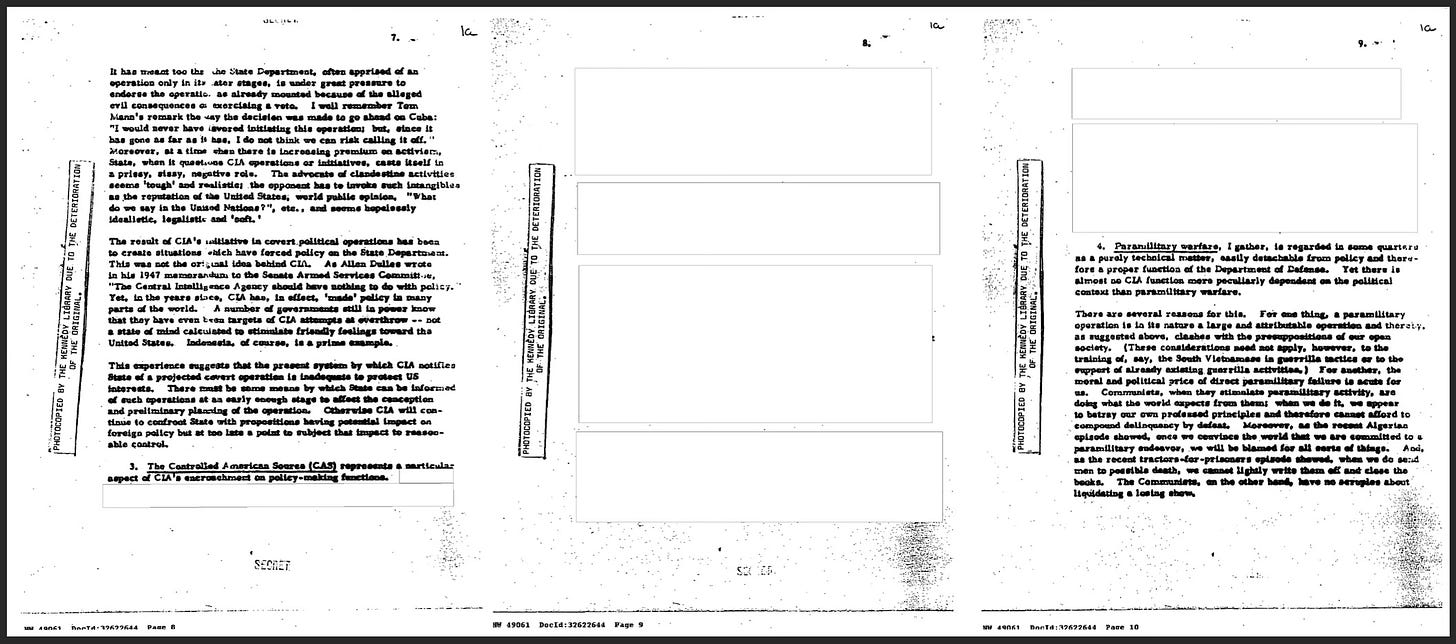The Disturbing World of Mike Pompeo
Trump’s former CIA director probably harbors a horrible secret

When Joe Rogan queried President Donald Trump on Oct. 25 about why he’d refused to open the JFK files in his first term, the three-time Republican nominee said:
So, I opened them up, partially. I was met with — from good people, I mean, you know, look, I mean good people — people that were well-meaning. Mike Pompeo was one of them. He’s a good person. They called me. They said, sir, we’d rather have you not. After… and I did open them, but I was asked by some people not to open them. There’s a Martin Luther King file too, by the way, that they’d like to see. I don’t know if you know, but there is that. But… But JFK in particular. So, they called me — a lot of good people called me, people that I, you know, that you would find reasonable people — and they asked me not to do it. So, I said, well, we’ll close it for another time. But if I win, I’m going to open them up. I’m just going to open.
After Rogan asked what the “hesitation” was, Trump immediately responded with, “Addresses. People that are still living. There are people that are affected.”
But Rogan did elicit this revealing admission from the once and future head of state:
“And there could be some national security reason that, for… you know, that I don’t have to necessarily know about.”
There was the rub.
It wasn’t just that Trump had only seen a fraction of the files. It was that some “good people” — including his then-CIA director, Mike Pompeo — had “interpreted” them for him. President Trump might have seen a few identities of people who’d worked as CIA agents 60-plus years ago, but he hadn’t seen anything very troubling after all.
In early 2023, veteran TV presenter John Stossel had interviewed Pompeo — who moved from Langley to Foggy Bottom to become secretary of state in 2018. Having recently published a book, “Never Give an Inch: Fighting for the America I Love” (January 2023), Pompeo was testing the waters for the Republican presidential nomination.
“Why did you fight to keep the JFK files secret?” asked Stossel.
“Because I was trying to keep Americans safe,” Pompeo answered hurriedly, visibly uncomfortable. “There are things that happened sixty years ago that are still important to keep in the vault.”
“Think of names and addresses and families. And by the way, there’s also no value in them. They just don’t hold the dark secrets that everybody wants to just hold up as the bogeyman.”
He also advised Stossel not to “paint with too broad a brush,” alleging “99.6 percent of all the JFK files are public today.”
There’s a grim, defensive stillness in Pompeo’s eyes as he discusses JFK, even while feigning amusement and gregariousness. He isn’t known for tenderness or compassion: credible reporting found that, under his tenure, the CIA plotted to kidnap — and possibly assassinate — Julian Assange when the Wikileaks founder was holed up in a foreign embassy in the U.K., America’s closest ally.
But after saying, in so many words, “Nothing to see there,” he makes this statement:
“I had a chance to see not all of those documents, but most of them. The news value of them is grossly overrated, and the desire to keep them secret — the motive, the rationale for keeping them secret — is wholly justified.”
I don’t consider myself an expert in lie detection, but Pompeo lied. It can’t be both “I haven’t seen all the documents” and “nothing to see there” at the same time. That’s a certain kind of lie, the kind where a person states as fact something they haven’t ascertained. One encounters this type of lie a lot in the JFK assassination research community, and I’ve written about it here before.
Another kind of lie is when you state something as fact that you know to be untrue. When Pompeo says, “Nothing to see there,” I think he’s telling both kinds of lie. Unlike Trump, Pompeo has seen something horrific, and — like Lady Macbeth repeating “Out, damned spot!” — he wants that something buried from public view forever.
Pompeo’s character, as he’s revealed it so far, offers no confidence in his passionate concern for — or commitment to — the truth. He poses as the relentless American “tough guy,” who’ll stop at nothing to advance U.S. national interests. He is nothing of the kind.
In an eerie moment, the subject turns to NSA whistleblower Ed Snowden.
Stossel: He should be executed? He’s a traitor?
Pompeo: Yeah.
Stossel: What he told the American people about, courts said was illegal.
Pompeo: Both of those thoughts can be held in one’s head at the same time.
The way Pompeo says this, in a short, emotionless burst, is chilling. If he had decided to do the interview to show the voting public what a personable, likable guy he was, it may have been this moment that dashed his chances. It is doubtful Mike Pompeo ever polled anywhere near as high as 1% nationwide, but if he did, one can imagine a “popularity dial” or tracker suddenly dipping as he said this, never again to rise.
His answer was unambiguously Orwellian. A meme that appeared over the past few years, making fun of the kind of surveillance state Snowden warned about, said “Make Orwell Fiction Again.” George Orwell actually wrote mostly non-fiction, but this meme refers to his dystopic novel, “Nineteen Eighty-Four” (1948), depicting the ubiquitous surveillance of citizens by a totalitarian state in a fully dehumanized environment bereft of “society.”
In the novel, people don’t publicly interact with each other except to remark how wonderful the state and its ruling Party are, even as ordinary citizens languish in drudgery, surrounded by warlike hagiography and shrill propaganda. In this scenario, the state knows so much about every individual that it can force them to betray even their loved ones by terrorizing them with their worst fears.

A key concept in Orwell’s dystopia is “doublethink,” the process of holding two opposing ideas in one’s mind and accepting both as true simultaneously. Citizens employ this exercise to rationalize manifest contradictions in the state’s words and actions before expunging such contradictions from their memories altogether.
Mike Pompeo, a graduate of Harvard Law School, is employing “doublethink.” A U.S. citizen uncovered crimes committed by the state against U.S. citizens, and that U.S. citizen should be executed for uncovering those crimes.
Snowden, a contractor, did evidently breach his contract of employment with the NSA. However, there is such a thing as an unconscionable contract, i.e., an agreement that can’t be enforced under the law because its terms are illegal. Also, penalties for breach of contract are generally limited to civil damages, as the lawyer Pompeo knows.
Yet in Snowden’s case, Pompeo advocates the ultimate criminal penalty: death. Did he think such posturing might somehow appeal to the voting public?

On whistleblowers such as Snowden, indulge me a little more pedantry to make a point.
When whistleblowers reveal illegalities committed by their employers — state or private — they’ve necessarily revealed offenses that would themselves be subject to legal sanction if committed by an individual citizen. The law doesn’t permit me to spy on my neighbor by bugging her telephone or secretly installing cameras in her home to watch her.
Spy agencies — e.g., CIA, NSA, and companies contracted to do their work — do this sort of thing with the understanding that they have to hide their activities from the public. If a citizen catches them committing a crime, the appropriate response shouldn’t be to point the finger and cry: “Death!” It should be, rather, to “take their licks” and lump it.
A story broken in the last six months by an outlet I write for, JFK Facts, involves a whistleblower who revealed — anonymously — that several years ago he had seen “something that disturbed him” in the possession of the CIA.
One of the items this unnamed individual saw was a CIA Inspector General’s report outlining a strategy for misleading or deceiving Congress when investigating the assassination of President Kennedy. Congress last investigated that crime in the late 1970s in the form of the House Select Committee on Assassinations (HSCA). No one now disputes that the CIA misled and deceived the HSCA’s investigators.
JFK Facts editor-in-chief Jefferson Morley went forward with this story while observing journalistic ethics, telling interviewers he hoped the former CIA employee would one day come forward, but for now, he didn’t have this person’s permission to reveal his identity. But what would this whistleblower have to fear from coming forward?
The CIA says we already have the full truth about the assassination in the form of the Warren Report of 1964. JFK was murdered by a “lone nut” who came out of nowhere to take everyone by surprise. Why would anyone fear anything from having seen something in the custody of the CIA related to a crime that’s already been fully solved?
Lying to Congress is a felony crime, and truth-seeking panels are vital instruments in creating social reconciliation after a nationally traumatic event, e.g., the public murder of President Kennedy in broad daylight on Nov. 22, 1963; the terror attacks of Sept. 11, 2001; the violent and vandalistic break-in at the U.S. Capitol on Jan. 6, 2021. In each case, elected officials have established a panel to find out what happened, on behalf of all of us.
But in each case, sadly, doubt and mistrust endured. That is why the HSCA reinvestigated the JFK assassination in the late 1970s, and the Assassination Records Review Board (ARRB) collected and analyzed all the assassination-related files it could secure, then made them available (in varying degrees of classification) to the public. Still, the CIA, our premier spy agency, deceived both the HSCA and ARRB.
This is fact, not theory. In light of such fact, why should Americans trust in the thoroughness or integrity of the 9/11 Commission or the 1/6 Committee, for example, in investigating the respective crimes involved? Were crimes concealed in each case, so that now we’re just waiting for the next collective trauma from another “state crime”?

Americans have, since our country’s founding, exhibited a certain level of healthy public mistrust in government. We have to exercise our right to entertain doubt in what state authorities tell us. The alternative — blind trust — is fraught with peril in a republic.
Pompeo was right to abort his presidential bid. By saying, in effect, “Trust me, there’s nothing to see there,” he’s made himself part of the problem. No one personifies more than Mike Pompeo the urgent need for transparency in President Kennedy’s demise. Emblemizing as he does the enduring and polarizing public mistrust in our society, he is wholly unsuited to serve as the benign face of the American nation-state.








Agree. Pompeo is lying
Every American should read this article. Great work, Chad.
Pompeo epitomizes everything that is wrong with this country. He's disgusting.